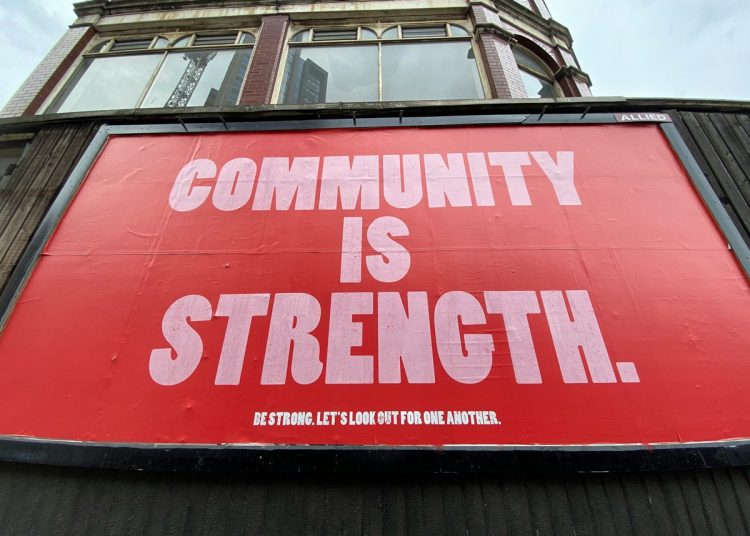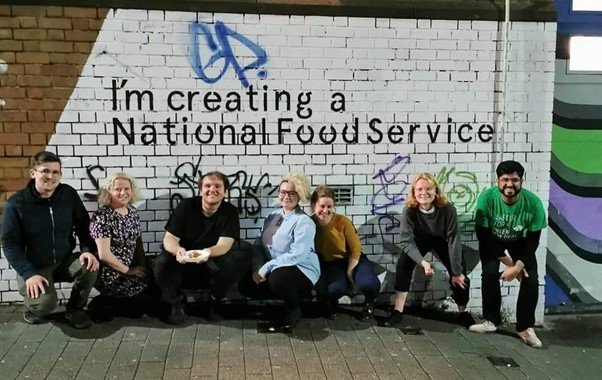UK
At the Crookes Community People’s Assembly, Sheffield residents united to discuss isolation, community-building, and creating spaces for connection
YORKSHIRE BYLINES

Photo by John Cameron on Unsplash
Last weekend I attended an event organised by Co-operation Sheffield, called the Crookes Community People’s Assembly. This was advertised as a space in which people could come together to discuss issues and make decisions collectively, in a way that all voices would be heard and valued equally. Food and a crèche were provided, to maximise people’s participation – particularly of those who are too often excluded from community events.
There were around 50 people there, across generations and demographics, all united by their love of Crookes and a desire to know and connect with their neighbours. The questions we were asked and the topics we begin to discuss were initially broad – what do you like about your community? what makes a strong and healthy community? – but a common theme quickly emerged: people feel, and are, isolated from each other.
Yearning for community
Someone attending said that they saw community as something to yearn for, rather than something they currently have, which cut through what many of us attending were feeling. We want to feel like a part of a community, and we don’t; we want to know our neighbours, and there are structural and local barriers that prevent that.
We yearn for community because we feel a lack, due to the individualisation and isolation that dominates our modern age.
We feel this at work. The move for many to work from home has been incredibly rewarding in so many ways – including less time being spent commuting, allowing for more leisure time – and those of us who do regularly work from home understandably feel protective of that right when the arguments against come from those with vested interests. But working from home does make it harder for us to be sociable, and leaves some more isolated than they might already be.

Region
A South Yorkshire bus revolution
byCllr Minesh Parekh
19 August 2024
Co-operative community hubs in Sheffield
One day I week I work from the Union St co-working space – a wonderful, co-operatively run co-working hub in Sheffield city centre. This allows me to meet and be around people, and have some of the positives of office socialisation while working with colleagues spread out across the country. With the traditional model of working from an office desk for eight hours dying a welcome death, places like Union St are fantastic in modelling a more utopic future, providing spaces to meet, eat, collaborate with others, without the traditional commercial landlords profiting from you doing so.
My only wish is that there more spaces like this spread out across the city, and – importantly – more spaces that are free to use. The decline of public libraries was raised at the Crookes assembly. The ward I represent is one of the few without a library – with pubs and churches having to fill the gap for local events, community building, and even hosting the council’s youth club.
Social decline
It is a sign of the social decline that has characterised my lifetime that I can’t think of any new libraries that have been created which haven’t replaced an existing library. The general trend has been of provision reduction, with less hours and volunteer staff. It is no exaggeration to say that we cannot justifiably call ourselves a ‘developed’ or ‘civilised’ country without the reversal of this trend.
Food was provided at the Co-operation Sheffield event. This was so important; logistically – this was over four hours, on a Sunday afternoon – there’s no way that many people would or could come without food being provided. But it’s deeper than that. Food is a connector that brings people together and reminds us that we are social beings.
Sheffield city centre used to have a space run by the Foodhall Project, which sought to build community through food. It ran a community kitchen providing good quality and tasty food on a pay-as-you-feel basis, and fostering community within. The National Food Service (NFS), a wider network of social eating spaces across the country, looked back to the history of British Restaurants – affordable public eating spaces, where good food was produced and eaten locally and communally – as a model for how the state could tackle food poverty and social isolation at the same time.

Photo by John Cameron on Unsplash
Last weekend I attended an event organised by Co-operation Sheffield, called the Crookes Community People’s Assembly. This was advertised as a space in which people could come together to discuss issues and make decisions collectively, in a way that all voices would be heard and valued equally. Food and a crèche were provided, to maximise people’s participation – particularly of those who are too often excluded from community events.
There were around 50 people there, across generations and demographics, all united by their love of Crookes and a desire to know and connect with their neighbours. The questions we were asked and the topics we begin to discuss were initially broad – what do you like about your community? what makes a strong and healthy community? – but a common theme quickly emerged: people feel, and are, isolated from each other.
Yearning for community
Someone attending said that they saw community as something to yearn for, rather than something they currently have, which cut through what many of us attending were feeling. We want to feel like a part of a community, and we don’t; we want to know our neighbours, and there are structural and local barriers that prevent that.
We yearn for community because we feel a lack, due to the individualisation and isolation that dominates our modern age.
We feel this at work. The move for many to work from home has been incredibly rewarding in so many ways – including less time being spent commuting, allowing for more leisure time – and those of us who do regularly work from home understandably feel protective of that right when the arguments against come from those with vested interests. But working from home does make it harder for us to be sociable, and leaves some more isolated than they might already be.

Region
A South Yorkshire bus revolution
byCllr Minesh Parekh
19 August 2024
Co-operative community hubs in Sheffield
One day I week I work from the Union St co-working space – a wonderful, co-operatively run co-working hub in Sheffield city centre. This allows me to meet and be around people, and have some of the positives of office socialisation while working with colleagues spread out across the country. With the traditional model of working from an office desk for eight hours dying a welcome death, places like Union St are fantastic in modelling a more utopic future, providing spaces to meet, eat, collaborate with others, without the traditional commercial landlords profiting from you doing so.
My only wish is that there more spaces like this spread out across the city, and – importantly – more spaces that are free to use. The decline of public libraries was raised at the Crookes assembly. The ward I represent is one of the few without a library – with pubs and churches having to fill the gap for local events, community building, and even hosting the council’s youth club.
Social decline
It is a sign of the social decline that has characterised my lifetime that I can’t think of any new libraries that have been created which haven’t replaced an existing library. The general trend has been of provision reduction, with less hours and volunteer staff. It is no exaggeration to say that we cannot justifiably call ourselves a ‘developed’ or ‘civilised’ country without the reversal of this trend.
Food was provided at the Co-operation Sheffield event. This was so important; logistically – this was over four hours, on a Sunday afternoon – there’s no way that many people would or could come without food being provided. But it’s deeper than that. Food is a connector that brings people together and reminds us that we are social beings.
Sheffield city centre used to have a space run by the Foodhall Project, which sought to build community through food. It ran a community kitchen providing good quality and tasty food on a pay-as-you-feel basis, and fostering community within. The National Food Service (NFS), a wider network of social eating spaces across the country, looked back to the history of British Restaurants – affordable public eating spaces, where good food was produced and eaten locally and communally – as a model for how the state could tackle food poverty and social isolation at the same time.

Olivia Blake with Foodhall organiser and local Labour activists, outside the Foodhall building in 2019
Sheffield Hallam’s MP Olivia Blake drew inspiration from the Foodhall Project and the NFS when she proposed the Labour Party establish community- and publicly-owned kitchens to ensure no one goes without good, nutritious food. As a society we need to think creatively about how to tackle our great social ills – and sustaining local social eating spaces to tackle the twin issues of food insecurity and loneliness is a sensible starting point.
Sheffield Hallam’s MP Olivia Blake drew inspiration from the Foodhall Project and the NFS when she proposed the Labour Party establish community- and publicly-owned kitchens to ensure no one goes without good, nutritious food. As a society we need to think creatively about how to tackle our great social ills – and sustaining local social eating spaces to tackle the twin issues of food insecurity and loneliness is a sensible starting point.
Co-operation over division
Co-operation Sheffield’s tagline on Instagram asks people whether they are ‘tired of being ignored by useless politicians?’ The question of how to best effect change is one I’ve long tried to crack – particularly having come into local government in the pursuit of transformation and found a sector that’s struggling to stand still.
If being more charitable, I know that it’s due to the efforts of local politicians and council officers to mitigate harms that things aren’t worse than they already are, but it’s right for campaigners’ starting points be to question why things remain the way they are.
It is important to look beyond maintaining a flawed status quo, and when things aren’t going as well as we would like them to be – or more importantly, as our communities deserve – we need to look for better answers than the ones we currently have.
Building stronger communities from the bottom up might not be the solution to all our problems, but it’s certainty the starting point to finding one.
Democracy on the brink?

Cllr Minesh Parekh
Minesh Parekh is councillor for Crookes and Crosspool, Sheffield, and chair of Sheffield Co-operative Party. He was recognised in the 2024 ENDS Report Power List, and in 2024 was a finalist for LGiU ‘Young Councillor of the Year’
No comments:
Post a Comment